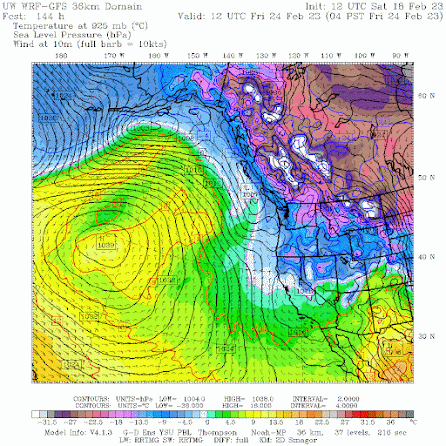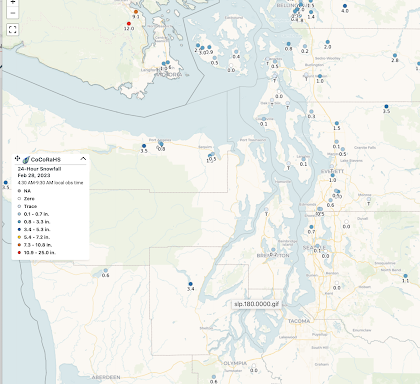This is a question I am often asked? How far out into the future can we predict the weather?
Listen to my podcast and I will provide the surprising, and complex, answer.
But first a few hints....
The National Weather Service has a website that shows how weather forecast skill declines over time (see below). This figure indicates how the forecast skill at roughly 18,000 ft (500-hPa) declines over time for the U.S. global model (NCEP), the Canadian model (CMC), and the gold-standard European Center (ECMWF). 1 indicates a perfect forecast. When this measure (the anomaly correlation) drops to 0.6 the forecast becomes only marginally useful.
Forecasts are very good through 3 days. Quite good though five days, but then rapidly declines after that. Some skill continues even two weeks out, but it is very marginal.
Another way to see the decline in skill is to look at a series of weather forecast maps for increasing forecast projection.Here is the analysis (truth) for sea level pressure (solid lines) and low-level temperatures (colors) for 4 AM on 24 February.
In contrast, the 240 hr (10-day forecast) has the high-pressure area hugely in error and shifted northward, and cold air (blue) flooding the northeast Pacific. Not good.
I generally don't trust forecasts beyond 7-8 days unless the ensembles of multiple forecasts are on the same page.
To listen to my podcast, use the link below or access it through your favorite podcast service.
PS: Here are the snow totals for last night. There was some snow everywhere but measurable snowfall was mainly north of Seattle. In most locations, it melted rapidly after it fell.








Sadly...the models are too easy to blame and the meteorologists are too quick to take credit for the models predictions....seems lately both the models and meteorologists are having a hard time predicting what happened yesterday much less the future...I'm still a fan and a sucker for weather but I think going forward the weather will be even harder to predict...getting to the point I'm just gonna watch for wind storms and atmospheric rivers... everything else just react to...lately that seems to be the norm for the peeps with the models...
ReplyDeleteIt's certainly better than it used to be. I have fond memories of reading weather.com 20 years ago when they would publish 10-day forecasts and days 7-10 would be straight-up nonsense. The initial forecast for the December, 2020 cold snap (highs around 30 and a bit of snow in NW Oregon) was low temperatures below zero. Maybe that was better - I got a laugh AND I knew that I shouldn't take the long-term forecast seriously.
ReplyDeleteI am surprised about how hurricane forecasting is. Sometimes the forecasts start with very small weather pre-hurricane activity as it begins off the coast of West Africa. The forecast then makes projections as to the eventual course of the hurricane long before it has become a hurricane. At least at times, they are quite good. Of course, a lot of this depends on how one defines a good forecast and what it is that constitutes a hit or a miss. The concept of a "perfect forecast" is not exactly self-defining. One can argue that the most important function of a forecast is to alert people of the potential for significant harmful events. I think one can also argue that the purpose of a forecast is not to prevent disappointment or inconvenience occasioned by the weather. In those cases, I think it is better to give a probabilistic forecast and allow the user to decide what to do with the information.
ReplyDelete